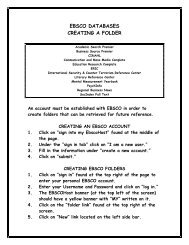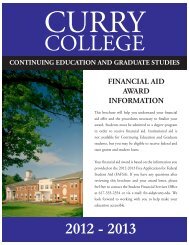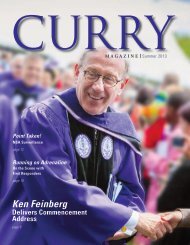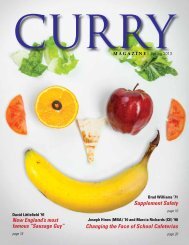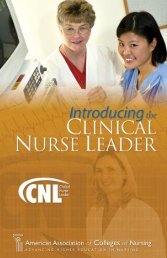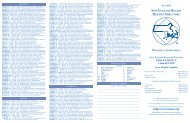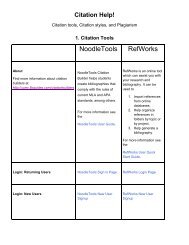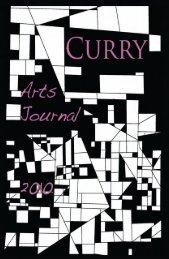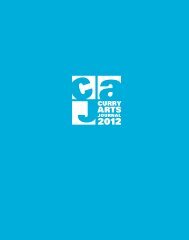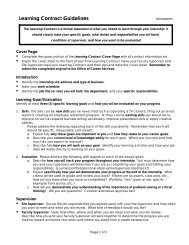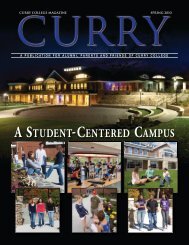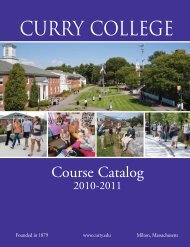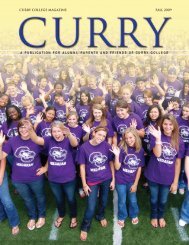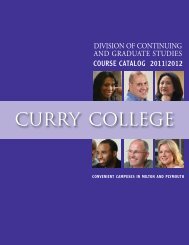Read the Curry College NEASC 2012 Self-Study Report.
Read the Curry College NEASC 2012 Self-Study Report.
Read the Curry College NEASC 2012 Self-Study Report.
You also want an ePaper? Increase the reach of your titles
YUMPU automatically turns print PDFs into web optimized ePapers that Google loves.
71<br />
significant role in <strong>the</strong> revision of <strong>the</strong> General Education curriculum. These involvements affect<br />
all areas discussed in this report, from budgeting for learning resources, to information literacy<br />
instruction and assessment, <strong>the</strong> design of virtual environments, and appropriate staffing.<br />
Information and Technological Literacy<br />
The Library’s information literacy program is geared toward addressing <strong>the</strong> need of students to<br />
find, evaluate and use appropriate learning resources. Recognizing that generic “library use”<br />
sessions, detached from meaningful context, are quickly forgotten, Library faculty are<br />
attempting to determine <strong>the</strong> best means of assessing and meeting <strong>the</strong> information literacy<br />
needs of first‐year students. Course‐specific sessions, which provide appropriate context, will<br />
continue to be promoted by Library faculty members. Longitudinal data for <strong>the</strong> purpose of<br />
assessing <strong>the</strong> growth of student competencies is now being ga<strong>the</strong>red. The Library faculty’s<br />
projects in this area have included:<br />
• Assessment of new student information literacy to inform pilot credit‐bearing offerings<br />
in information literacy.<br />
• A pilot, stand‐alone credit‐bearing course in Library Research Methods, offered in Fall<br />
2006.<br />
• A Community of Inquiry investigation involving Levin Library faculty in AY2009, focused<br />
on <strong>the</strong> effectiveness of embedding LibGuides in specific courses to achieve information<br />
literacy student outcomes.<br />
• Coordination, as of Fall 2010, of library instruction across First Year Seminar, AC1000,<br />
and Writing Workshop sections, to minimize redundant student exposure to <strong>the</strong> same<br />
material offered through a one‐credit learning community course linked to a First Year<br />
Seminar course<br />
• A one‐credit course offered in Fall 2010, taught as part of a learning community with<br />
linked courses in First Year Seminar and Communication.<br />
• Creation of a robust set of department‐specific resources to increase information<br />
literacy and critical thinking skills.<br />
• Implementation of Project SAILS, administered in <strong>the</strong> Fall of 2011 to entering members<br />
of <strong>the</strong> class 2015 (A description of <strong>the</strong> SAILS assessment appears in Standard Two).<br />
• Explicit integration of Information and Computer Literacy in <strong>the</strong> revised description of<br />
AC1000, <strong>the</strong> introductory Applied Computing class.<br />
• Organization of “Transitioning to Higher Education: A Grade 9‐16 Librarian<br />
Collaborative,” a group of high school and academic librarians committed to raising<br />
competency in all literacies for grade 9‐16 students. The group explores strategies, and<br />
makes recommendations to help high school students prepare for and adapt to higher<br />
education research tasks. clv<br />
• The ongoing development of a curriculum for teacher educators based on <strong>the</strong> May 2011<br />
Information Literacy Standards for Teacher Education, published by ACRL. clvi<br />
As indicated, nei<strong>the</strong>r <strong>the</strong> Library nor individual degree programs have, to date, actually assessed<br />
<strong>the</strong> extent to which students attain levels of proficiency appropriate to <strong>the</strong>ir degree, subject or<br />
professional field of study. That goal, along with determining measures to assess changes in<br />
students’ sophistication in evaluating <strong>the</strong> quality of information sources, is addressed within<br />
<strong>Curry</strong> <strong>College</strong> <strong>2012</strong> <strong>Self</strong>-<strong>Study</strong><br />
Standard Seven



